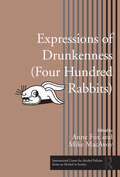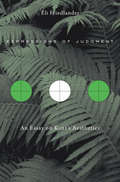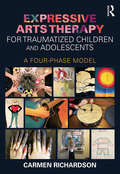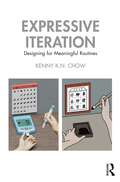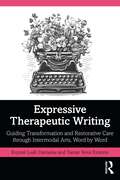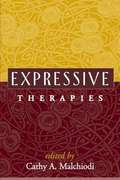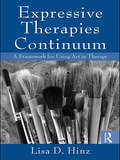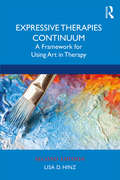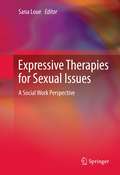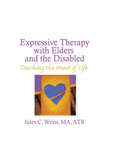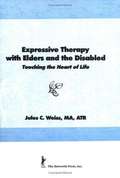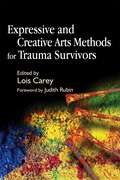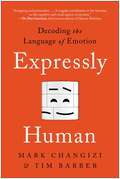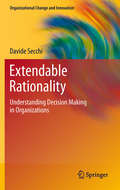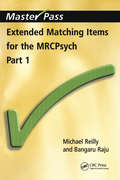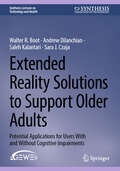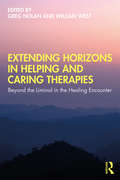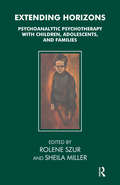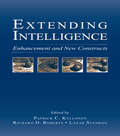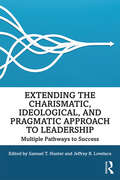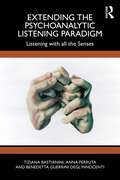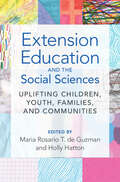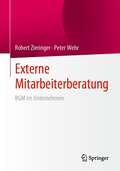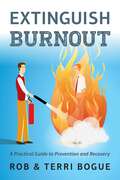- Table View
- List View
Expressions of Drunkenness (ICAP Series on Alcohol in Society)
by Anne FoxThe goal of this book is to contribute to the ongoing scholarly discussion on the very serious topic of drunkenness. The phrase “four hundred rabbits” is one of many illustrations of the deep cultural, religious, and social influences on how individuals and communities view alcohol intoxication: The Aztecs believed alcohol to have a divine origin, with a god and goddess giving birth to 400 (meaning “innumerable” in ancient Aztec) divine children or “rabbit gods,” each representing a varying degree and expression of alcohol intoxication and drunkenness. Hence the book’s subtitle, which at first glance might seem light-hearted but in fact represents an in-depth look at a weighty topic. With such rooted sociocultural factors in mind, the International Center for Alcohol Policies (ICAP) and DrinkWise Australia collaborated to prepare a publication that advances current understanding of the individual and collective meanings, purposes, and functions of drunkenness. As the authors explain, interpretations by different disciplines of the terms intoxication and drunkenness are often inconsistent. The chapters of this book discuss intoxication and drunkenness from three perspectives: biological, cultural, and social. By placing intoxication and drunkenness into these contexts, the book is able to offer language and conceptual tools to help advance the ongoing discussion on how best to reduce alcohol-related harm and encourage responsible enjoyment of beverage alcohol. Readers in need of an in-depth understanding of the varied dimensions of extreme drunkenness will add this excellent resource to their personal library.
Expressions of Judgment: An Essay on Kant's Aesthetics
by Eli FriedlanderThe Critique of Judgment-the third and final work in Kant's critical system-laid the groundwork of modern aesthetics when it appeared in 1790. Eli Friedlander's reappraisal of this seminal accomplishment reformulates and elucidates Kant's thought in order to reveal the inner unity of the Third Critique. Expressions of Judgment emphasizes the internal connection of judgment and meaning in Kant's aesthetics, showing how the pleasure in judging is intimately related to our capacity to draw meaning from our encounter with beauty. Although the meaningfulness of aesthetic judgment is most evident in the response to art, the appreciation of nature's beauty has an equal share in the significant experience of our world. Friedlander's attention to fundamental dualities underlying the Third Critique-such as that of art and nature-underscores how its themes are subordinated systematically to the central task Kant sets himself: that of devising a philosophical blueprint for the mediation between the realms of nature and freedom. This understanding of the mediating function of judgment guides Friedlander in articulating the dimensions of the field of the aesthetic that opens between art and nature, the subject and the object, knowledge and the will, as well as between the individual and the communal. Expressions of Judgment illuminates the distinctness as well as the continuity of this important late phase in Kant's critical enterprise, providing insights for experienced scholars as well as new students of philosophy.
Expressive Arts Therapy for Traumatized Children and Adolescents: A Four-Phase Model
by Carmen RichardsonExpressive Arts Therapy for Traumatized Children and Adolescents is the book so many expressive arts and trauma therapists have been waiting for. Not only does it lay out an organized, thorough framework for applying varied expressive arts modalities, it provides clear directions for the application of these modalities at different phases of treatment. Both beginning and experienced clinicians and students will appreciate the thoughtful analyses of ways for introducing expressive arts to clients, engaging clients with their art, being present to the art that is created, and working within a particular session structure that guides the treatment process. Readers will also receive more specific learning regarding the process of using body-focused and sensory-based language and skills in the process of trauma treatment over time. They’ll pick up more than 60 priceless expressive-arts assessment and treatment interventions that are sure to serve them well for years to come. The appendices features these interventions as photocopiable handouts that will guide the therapist working with youth through each phase of treatment.
Expressive Iteration: Designing for Meaningful Routines
by Kenny K.N. ChowA ground-breaking guide to thinking about how routine activities can be designed and innovated to develop narrative meaning and a sense of purpose.Iteration is an integral part of daily routines, such as sleep-wake cycles, commuting, workouts, chores, or practising an instrument. While many iterations just monotonously repeat, others can lead to progression or evolution. With subtle variations among iterations, we can create meaning out of repetitive acts, forging narratives from them and thus making them meaningful to us. Chow draws on rhetoric, psychology, narratology, and design-thinking to show both in theory and in practice how we can innovate the design of mundane and routine activities to give them meaning and expression. He does so by examining Asian and European-originated examples, across a range of domains including visual arts, literature, digital art, video games, and mobile applications.A must-read for designers and enthusiasts looking for ways to innovate across all domains and media and transform tedious repetitive activities into acts of intention.
Expressive Therapeutic Writing: Guiding Transformation and Restorative Care through Intermodal Arts, Word by Word
by Krystal Leah Demaine Tamar Reva EinsteinThis book brings engagement and conversation to a cross‑pollination of creative and expressive writing and multi‑modal art forms.Through the lens of expressive arts therapy, the authors demonstrate how writing can reveal the unexpected that emerges from art making. The lineage of expressive arts therapy includes artful writing, poetry, associative, creative, and memoir, for example, to engage in self‑discovery, growth, and restorative care. Each chapter is grounded in intermodal expressive arts with a central focus on creative and expressive writing, which is informed by movement, visual art, storytelling, music, sound, photography, and physical performance, including response art, and has writing prompts and invitations as well as playful and improvisational integrative arts writing explorations.Creative arts therapists and expressive therapists actively searching for creative playful self‑reflective writing practice will find this book a rewarding resource.Krystal Leah Demaine, PhD, MT‑BC, REAT, CTRS‑C, RYT, music therapist, expressive arts therapist, and professor of expressive therapies at Endicott College, practices HEARTful healing note by note through song, story, poetry, and creative curiosity.Tamar Reva Einstein, PhD, REAT, expressive arts therapist, poet/artist, and teacher, crosses cultural borders in Jerusalem with the arts as her mother tongue, threading writing and arts like her threaded beads and amulets.
Expressive Therapies
by Cathy A. MalchiodiPsychotherapists, counselors, and other health care professionals are increasingly turning to expressive therapies--including art, music, dance/movement, drama, poetry, play, sandtray, and integrative approaches--in their work with clients of all ages. This timely volume offers a comprehensive presentation of these innovative and powerful modalities. Expert contributors present in-depth descriptions of their respective approaches to intervention with children, adults, and groups, giving particular attention to strategies for integrating expressive work with other forms of psychotherapy.
Expressive Therapies Continuum: A Framework for Using Art in Therapy
by Lisa D. HinzExpressive Therapies Continuum is distinctive in its application as a foundational theory in the field of art therapy. First developed by Vija Lusebrink, this theory can be used by persons of any theoretical orientation, and has the ability to unite art therapists of varying backgrounds. The information contained in this book demonstrates how the Expressive Therapies Continuum provides a framework for the organization of assessment information, the formulation of treatment goals, and the planning of art therapy interventions. It provides rich clinical detail and many case examples that enliven the text and promote student engagement and learning. Hinz divides material into three parts. The first describes the historical roots of the Expressive Therapies Continuum and pays homage to contributions from the fields of art and psychology. The seven component parts of the ETC are examined in the second part, and the last part of the book is dedicated to assessment and clinical applications. This book's easy-to-use format and effectiveness in teaching history and application make it an essential reference for therapists and students.
Expressive Therapies Continuum: A Framework for Using Art in Therapy
by Lisa D. HinzDistinctive in its application as a foundational theory in the field of art therapy, this up-to-date second edition demonstrates how the Expressive Therapies Continuum provides a framework for the organization of assessment information, the formulation of treatment goals, and the planning of art therapy interventions. In addition to the newest research supporting the uses of art in therapy, this volume offers the latest research in media properties and material interaction, the role of neuroscience in art therapy, emotion regulation, and assessment with the Expressive Therapies Continuum. It provides case studies to enliven the information and offers practical suggestions for using art in many and varied therapeutic ways. Through rich clinical detail and numerous case examples, this book’s easy-to-use format and effectiveness in teaching history and application make it an essential reference for practitioners and students alike.
Expressive Therapies for Sexual Issues
by Sana LoueThis text is intended to help social work practitioners move beyond both these often-accepted constructions of sexuality and the range of methods that are available to social workers in their clinical practice. Various themes are apparent throughout each of the chapters in this volume: the range of sexual experience and expression that exists across individuals; a recognition of our society's responses to expressions of sexuality, including the social, attitudinal, and cultural barriers that inhibit the expression of healthy sexuality and that constrain our approaches to assisting individuals with their recovery from trauma; the need to consistently and painstakingly examine our own assumptions relating to sexuality in order to be more effective with our clients; and the delicate balance that is often required when working with clients around issues of sexuality in the context of institutions, community, and societal structures.
Expressive Therapy With Elders and the Disabled: Touching the Heart of Life
by Jules C WeissA classic book on the use of expressive therapies with uncommunicative elders and the disabled. This poignant guide explores group and individual therapeutic activities that promote creativity, self-expression, communication, and understanding of one’s life. An experienced art therapist relates his insights into the psychosocial dynamics of elders and the disabled and shares his awareness of the sensitivity and understanding required to reach the “unreachable.” Health care workers will find this illustrated volume rich in therapeutic techniques and processes applicable to the care and growth of psychologically and physically disabled or minimally handicapped adults and elders.
Expressive Therapy with Elders and the Disabled: Touching the Heart of Life
by Jules C. WeissA classic book on the use of expressive therapies with uncommunicative elders and the disabled. This poignant guide explores group and individual therapeutic activities that promote creativity, self-expression, communication, and understanding of one's life. An experienced art therapist relates his insights into the psychosocial dynamics of elders and the disabled and shares his awareness of the sensitivity and understanding required to reach the "unreachable. " Health care workers will find this illustrated volume rich in therapeutic techniques and processes applicable to the care and growth of psychologically and physically disabled or minimally handicapped adults and elders.
Expressive and Creative Arts Methods for Trauma Survivors
by Lois Carey'With the increasing probability of floods, wars, and human displacement, there will be a great need for health care professionals to help. The arts provide a new, human, and cost-effective way to bring relief and to ease some of the human suffering associated with trauma.The editor, Lois Carey, presents a compelling rationale for the use of the arts therapies to work with trauma. First, it is now clear that traumatized children have difficulty using words to describe their experience. Drawing, play, music and other creative forms allow for an indirect expression that reduces anxiety, and they also help to establish a therapeutic relationship and an area of safety. The same is true for traumatized adults, who are often nonverbal... this book can be a beginning of much-needed documentation of the use of the expressive arts methods for trauma survivors and will provide a significant and useful introduction to the field for health professionals.' - PsycCRITIQUES 'I think the descriptions of the methods are interesting and they show a lot of experience in the field of trauma-treatment. It is a well written, very readable book of the practice.' -Tijdschrift voor Vaktherapie (Journal of Therapy) 'This book throws more light on different expressive and creative arts methods in the treatment of trauma. In detailed case studies and research, the authors offer an overview of creative arts methods aiming at brain functions which are not always being reached by verbal therapy alone.' -Tijdschrift voor Vaktherapie (Journal of Therapy) 'The authors use a rich mix of interesting case material and useful explanation of the techniques for the uninitiated.' - Therapy Today 'A very good job of promoting the use of expressive arts therapy to complement talking therapies and achieve results that talking therapy cannot.' - Play Therapy UK 'If you are a parent, dealing daily with the effects of traumatised children, and especially finding it difficult to firstly access specialist therapy and secondly to understand the principles in relation to your child, then this book will give you a clear understanding of the aims and outcomes of therapies which may be on offer.' - www.adoption-net.co.uk Expressive and Creative Arts Methods for Trauma Survivors demonstrates how play, art, and music therapies, as well as sandplay, psychodrama and storytelling, can be used to aid the recovery of trauma victims. Drawing on detailed case studies and a growing body of evidence of the benefits of non-verbal therapies, the contributors-all leading practitioners in their fields-provide an overview of creative therapies that tap into sensate aspects of the brain not always reached by verbal therapy alone. Methods of exploring traumatic experiences with a view to limiting patients' distress are also explored. The techniques discussed are appropriate for work with children, families and groups and are based on established approaches, including Jungian, Child-centred, Gestalt and Freudian theories. Expressive and Creative Arts Methods for Trauma Survivors will be an enlightening read for expressive and specialized arts therapists and for students and academics in these fields.
Expressly Human: Decoding the Language of Emotion
by Mark Changizi Tim BarberGood communication, conventional wisdom suggests, is calm, logical, rational. Emotions, we&’re told, just get in the way. But what if this is backwards? What if those emotional overtones are the main messages we&’re sending to one another, and all that logical language is just window dressing? Over billions of years of evolution, animals have become increasingly sophisticated and increasingly sentient. In the process, they evolved emotions, which helped improve their odds of survival in complex situations. These emotions were, at first, purely internal. But at some point, social animals began expressing their emotions, in increasingly dramatic ways. These emotional expressions could accurately reflect internal emotions (smiling to express happiness)—or they could be quite different (smiling to cover up that you&’re actually furious, but can&’t tell your boss that). Why did once-stone-faced animals evolve to be so emotionally expressive—to be us? The answer, as evolutionary neurobiologist Mark Changizi and mathematician Tim Barber reveal, is that emotional expressions are our first and most important language—one that allows us, as social animals, to engage in highly sophisticated communications and negotiations. Expressly Human introduces an original theory that explains, from first principles, how the broad range of emotional expressions evolved, and provides a Rosetta Stone for human communication. It will revolutionize the way you see every social interaction, from deciding who gets the last slice of pizza to multimillion-dollar business negotiations, and change your definition of what makes us human.
Extendable Rationality
by Davide Secchi"How do people make decisions in organizations?" is the question at the core of this book. Do people act rationally? Under what conditions can information and knowledge be shared to improve decision making? Davide Secchi applies concepts and theories from cognitive science, organizational behavior, and social psychology to explore the dynamics of decision making. In particular, he integrates "bounded rationality" (people are only partly rational; they have (a) limited computational capabilities and (b) limited access to information) and "distributed cognition" (knowledge is not confined to an individual, but is distributed across the members of a group) to build upon the pioneering work of Herbert Simon (1916-2001) on rational decision making and contribute fresh insights. This book is divided into two parts. The first part (Chapters 2 to 5) explores how recent studies on biases, prospect theory, heuristics, and emotions provide the so-called "map" of bounded rationality. The second part (Chapter 6 to 8) presents the idea of extendable rationality. In this section, Secchi identifies the limitations of bounded rationality and focuses more heavily on socially-based decision processes and the role of "docility" in teaching, managing, and executing decisions in organizations. The practical implications extend broadly to issues relating to change and innovation, as organizations adapt to evolving market conditions, implementing new systems, and effectively managing limited resources. The final chapter outlines an agenda for future research to help understand the decision making characteristics and capabilities of an organization.
Extended Matching Items for the MRCPsych: Part 1 (MasterPass)
by Michael Reilly Bangaru RajuExtended Matching Items (EMIs) are becoming increasingly important part of the MRCPsych written examination This book prepares candidates by describing the format of EMIs, followed by numerous examples of typical examination questions. It covers the four main subject areas of the examination: psychology and human development; psychopharmacology; descriptive and psychodynamic psychopathology; and clinical theory and skills. Questions are ordered in increasing difficulty so that candidates not familiar with the format of EMIs can progressively test their examination preparation. Full answers, explanations and references are provided.
Extended Reality Solutions to Support Older Adults: Potential Applications for Users With and Without Cognitive Impairments (Synthesis Lectures on Technology and Health)
by Sara J. Czaja Walter R. Boot Andrew Dilanchian Saleh KalantariThis book explores one way in which recent hardware and software advances have placed humanity on the precipice of a significant shift in how technology can shape our interactions with the world around us: the application of transformative extended reality (XR) technology solutions to support the health, wellness, quality of life, and independence of older adults living with and without cognitive impairments. The book provides an overview of the state-of-the art research on XR-based solutions utilizing virtual reality (VR) and augmented reality (AR), challenges that can addressed with these technologies, evidence to date on the efficacy of these solutions, and the nature of these solutions and challenges to their implementation. It explores practical ways XR can be integrated into health and lifestyle maintenance activities for older populations in a diversity of situations through thematic chapters using realistic personas and scenarios. These thematic chapters are organized around the AGE-WELL Challenge Area topics, including staying connected, healthy lifestyles and wellness, mobility, and cognitive health, as well as an additional emphasis on leisure. Other chapters provide guidance on important issues to consider when designing XR-based solutions for older adults, how to evaluate and test XR solutions, the implementation of the user-centered design process, and the book concludes by highlighting unanswered questions and future research directions. This book approaches XR for older adults with and without cognitive impairments from the authors’ diverse research backgrounds in psychology, engineering, gerontology, and design. It will be of interest to academic and industry professionals as well as care providers considering the potential for XR interventions now and in the future.
Extending Horizons in Helping and Caring Therapies: Beyond the Liminal in the Healing Encounter
by Greg Nolan William WestThis vital new book examines how healing encounters might further the horizons of practice and extend innovation in professional interpersonal relationships. Highly qualified contributors explore ways in which insights into individual, cultural and community meanings open further perspectives on human being and help clarify what can feel a confusing present and an increasingly unpredictable future. Divided into parts on Personal and Professional Identity, Culture and Personal Context, Practice Research, and Clinical Practice, each chapter opens up thinking on crucial contemporary issues, informed by personal and clinical practice case-study examples and by findings from leading-edge research investigations, adding to the current literature on both theory and practice. This book brings together voices from the margins, offering alternative practice perspectives that look beyond protocol and statistics-based therapy, emphasising the relational richness that informs professional interpersonal encounters in the support of mental health and wellbeing. It will be of immense value to counsellors and psychotherapists in training and practice, as well as for related mental health professionals and those with an interest in the caring professions.
Extending Horizons: Psychoanalytic Psychotherapy with Children, Adolescents and Families
by Sheila Miller Rolene SzurExtending Horizons presents a wide-ranging collection of papers by leading practitioners in the field of analytic psychotherapy with children and young people, surveying recent developments in technique and theory; the application of the discipline to special areas of work; and its integration, in certain contexts, with other systems such as family and group psychotherapy. From its origins in the traditional 'one-to-one relationship' between therapist and patient, as exemplified in the pioneering work of Anna Freud, Melanie Klein and Margaret Lowenfeld, the contributors to this present volume demonstrate how child and adolescent psychotherapy has advanced its frontiers in recent years to deal with specific areas of concern, such as child sexual abuse and mental or physical disability, and adapted itself - sometimes, initially, as a result of pressures imposed by the lack of adequate resources - to applications in wider settings where multi-disciplinary factors are engaged and the 'one-to-one relationship' is waived in preference to parent/child, family or group modes of treatment.
Extending Intelligence: Enhancement and New Constructs (Educational Psychology Series)
by Richard D. Roberts Patrick C. Kyllonen Lazar StankovThis volume presents research from a variety of perspectives on the enhancement of human intelligence. It is organized around five themes – enhancement via instruction; enhancement via development (over the life cycle); enhancement over time; enhancement via new constructs; and new directions in enhancement. Three key issues are addressed: First, although most of the scientific research on intelligence has concerned what it is, this volume attends to the consequential societal and economic issue concerns of whether it can be increased, and how. Second, intellectual enhancement is particularly important when targeted to minorities and the poor, groups that have typically performed relatively less well on intelligence and achievement measures. This volume reflects the education community's ongoing interest in understanding, and attempting to close, achievement or test score gaps. Third, most of the attention to examining intellectual enhancement, and in accounting for and closing the test-score gap, has focused on general cognitive ability. In line with the current emphasis on considering intelligence from a wider perspective, this volume includes constructs such as emotional and practical intelligence in definitions of intellectual functioning. Extending Intelligence: Enhancement and New Constructs is an essential volume for researchers, students, and professionals in the fields of educational psychology, intelligence, educational measurement and assessment, and critical thinking.
Extending the Charismatic, Ideological, and Pragmatic Approach to Leadership: Multiple Pathways to Success
by Samuel T. Hunter Jeffrey B. LovelaceThe past 15 years of leadership research have taught us a valuable lesson: There is more than one way to be a successful leader. The Charismatic, Ideological, and Pragmatic (CIP) approach to leadership showcases three unique yet equally viable pathways to leading and influencing others. This book reviews the history of the CIP model of leadership and summarizes the empirical findings supporting the framework. Emerging areas of leadership research on the CIP model are explored, including: followership, shared leadership, measurement, and gender. Contributions from a range of international academics provide readers with insight into the foundation of the CIP theory of leadership and into where the future of leadership perspectives are headed. It includes a chapter for practitioners seeking to understand the framework through an applied lens and offers evidence for a new scale designed to quantify a leader’s CIP profile. Finally, a revised theoretical framework, incorporating key findings to expand the model to meet the diverse needs of future researchers and leaders is offered. This thought-provoking volume will be essential reading for all scholars, researchers and students interested in the charismatic, ideological, and pragmatic approach to leadership, as well as professionals considering the introduction of a new leadership model.
Extending the Psychoanalytic Listening Paradigm: Listening with all the Senses
by Tiziana Bastianini Anna Ferruta Benedetta Guerrini Degl’InnocentiExtending the Psychoanalytic Listening Paradigm: Listening with all the Senses guides readers through the nuances of non-verbal communication in the analytic setting.Presenting a dialogue between three eminent psychoanalysts, this book is made up of numerous case studies and commentaries on patients presenting difficulties with symbolisation, including borderline and primitive mental states. Each analyst presents a different aspect of psychoanalytic listening – body, action, and speech – from a different perspective, before the three come together to analyse these situations. The authors highlight the importance of listening as a device for the analyst, showing how it is used not only to make the repressed emerge, to repair what is traumatic and to activate the continuity of the self, but also as a contribution to constructing the subject throughout the sequence of interactions with the other-than-self. The authors propose an extension of the concept of the unconscious and of the tools used by the analyst in the consulting room: the unconscious states not yet verbalised of the first experiences of psychic life are reached through listening to communications that use other sensory communication channels outside of the verbal.Bookended by a preface from Stefano Bolognini and an afterword from Francesco Barale, this accessible yet thorough volume is a vital tool for any psychoanalyst or psychotherapist.
Extension Education and the Social Sciences: Uplifting Children, Youth, Families, and Communities
by de Guzman, Maria Rosario T. Holly HattonThe Cooperative Extension System serves as the conduit through which scientific knowledge generated by the 130 land-grant colleges and universities in the United States is translated and delivered directly to its constituents. Since its inception over 100 years ago, Extension has been integral in developing, delivering, and applying cutting-edge knowledge in agriculture and natural resources, youth development, family and consumer sciences, and community and rural development. Today, more than ever, Extension will need to lead the way in building and maintaining sustainable partnerships across disciplines and with organizations at the local, state, and national levels to tackle complex issues considering diminishing resources. Bringing together leading and emerging scholars, this volume discusses how Extension is addressing issues and opportunities relevant to children, youth, families, and communities across the country both now and in the future. Topics include Extension's role in supporting childcare, social media use, entrepreneurship, rural communities, and underserved audiences.
Externalism, Self-Knowledge, and Skepticism
by Sanford C. GoldbergWritten by an international team of leading scholars, this collection of thirteen new essays explores the implications of semantic externalism for self-knowledge and skepticism, bringing recent developments in the philosophy of mind, the philosophy of language, and epistemology to bear on the issue. Structured in three parts, the collection looks at self-knowledge, content transparency, and then meta-semantics and the nature of mental content. The chapters examine a wide range of topics in the philosophy of mind and the philosophy of language, including 2D semantics, transparency views of self-knowledge, and theories of linguistic understanding, as well as epistemological debates on contextualism, contrastivism, pragmatic encroachment, anti-luminosity arguments and testimony. The scope of the volume will appeal to graduate students and researchers in epistemology, philosophy of mind, philosophy of language, cognitive science, psychology and linguistics.
Externe Mitarbeiterberatung: BGM im Unternehmen
by Peter Wehr Robert ZieringerDieses Buch bietet eine fundierte Einführung zur Auswahl, Einführung, Qualitätskontrolle und Nutzen eines Mitarbeiterunterstützungsprogrammes und richtet sich an interessierte Leser aus den Bereichen Human Resources, Arbeitsmedizin, Arbeitssicherheit, Betriebliches Gesundheitsmanagement und Unternehmensleitung. Mitarbeiterunterstützungsprogramme, auf Englisch auch Employee Assistance Program (EAP) genannt, sind eine mittlerweile vielfach angebotene Dienstleistung, die Unternehmen helfen soll die Gesundheit ihrer Mitarbeiter zu erhalten. Mitarbeiter können sich (auf Kosten des Arbeitgebers) beim EAP-Anbieter zu Themen der psychischen Gesundheit, teils auch zu körperlichen Beschwerden, finanziellen, rechtlichen sowie familiären Themen beraten lassen. Sie werden sowohl mit den theoretischen Grundlagen der Mitarbeiterberatung als auch mit den organisatorischen Aspekten vertraut gemacht. Das Buch greift auf Beispiele aus der Unternehmenspraxis zurück, nähert sich aber auch wissenschaftlich dem Thema, indem Studien zur Auswirkungen von Mitarbeiterunterstützungsprogrammen auf Fehlzeiten, Produktivität, Arbeitsunfälle und Mitarbeiterbindung behandelt werden.
Extinguish Burnout: A Practical Guide to Prevention and Recovery
by Terri Bogue Rob BogueBurnout can leave you feeling stuck, exhausted, and powerless but there is a path out. Extinguish Burnout is a clear, compassionate and research-informed guide to understanding what drives burnout and how to overcome it. Authors Rob and Terri Bogue offer readers practical tools and short, actionable chapters that can be easily digested even in moments of overwhelm. From improving self-talk and building resilience to asking for support and setting realistic expectations, this book transforms abstract well-being concepts into daily habits that restore energy and hope.· What causes burnout and how to escape· How to more realistically value the results you're getting· When to ask for and receive more support· What four simple physical self-care activities reduce burnout· How to change your self-talk for the better· What to do to manage your demands so you're not so exhausted· How to better recognize your personal value· How to integrate your self-image and reduce your stress· How to identify and eliminate barriers to your efficacy· How to build resilience against setbacks· Why hope is essential· Why failure isn't final· How to be detached without being disengaged Ideal for anyone feeling worn down by work or life, it provides the insight and encouragement needed to move from surviving to thriving.
